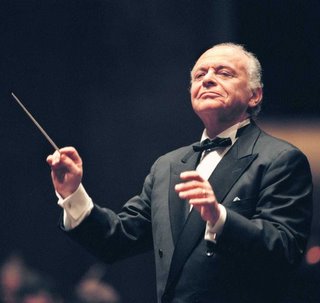Enough Bang to Make You Whimper
 The New York Philharmonic has had a rough patch in recent years: the oldest active orchestra in the United States has struggled to maintain its critical reputation under both Kurt Masur and Lorin Maazel. The reasons behind the ensemble's decline are often blamed on those music directors and their relationship to the musicians. This is unfair to both Masur and Maazel, whom we have heard in a much better light with other orchestras. Still, for his last appearance with the New York Philharmonic here in Washington on Saturday afternoon, opening the Washington Performing Arts Society visiting orchestra series in the Kennedy Center Concert Hall, Maazel could hardly have chosen a duller program. Two big Tchaikovsky pieces showcased the orchestra's stultifying, ear-crushing power, but for all of the musicians' dedication to accurate and powerful playing, the relentless sameness of the program made for a vanilla, lackluster concert.
The New York Philharmonic has had a rough patch in recent years: the oldest active orchestra in the United States has struggled to maintain its critical reputation under both Kurt Masur and Lorin Maazel. The reasons behind the ensemble's decline are often blamed on those music directors and their relationship to the musicians. This is unfair to both Masur and Maazel, whom we have heard in a much better light with other orchestras. Still, for his last appearance with the New York Philharmonic here in Washington on Saturday afternoon, opening the Washington Performing Arts Society visiting orchestra series in the Kennedy Center Concert Hall, Maazel could hardly have chosen a duller program. Two big Tchaikovsky pieces showcased the orchestra's stultifying, ear-crushing power, but for all of the musicians' dedication to accurate and powerful playing, the relentless sameness of the program made for a vanilla, lackluster concert.
The third orchestral suite (G major, op. 55) has two dance movements at its center, a second-movement waltz that Maazel took at a fleet tempo, more agitated than melancholy. It matched the scherzo third movement, fretful with repeated notes, perhaps too fretful in the trio, a dance of misplaced accents. The playing was rhythmically tight, crisp, athletic, but one could not help thinking of how Tchaikovsky pronounced in his diary during the composition of this music that he was very dissatisfied "because of the banality of everything that comes into my head." To his self-critical question "Am I played out?" this performance, in spite of its virtuosic polish, seemed to answer a resounding Yes.
The fourth symphony, although a more coherent work, was more of the same, imperious brass and daring technical challenges but ultimately empty. The plaintive, fragile oboe solo that opened the second movement seemed promising, but the fuller sections were oppressively ponderous, the slowish tempo contributing to an overall massiveness. Rubato slathered on thickly deadened the pace at times, adding to the leaden, overly sentimental tendency of this music. Cracks in the technical finish appeared in the pizzicato scherzo, taken at a breathless tempo but far from light and effortless, as in the sloppy triplet figures in the strings and the squirrelly piccolo solo in the trio. The vulgar boom of the symphony's last movement inevitably stuns audiences into wild approval. Sticking to his guns, Maazel even chose Tchaikovsky for the encores.
Anne Midgette, The Philharmonic: Strong but Showy (Washington Post, October 6)
Peter Dobrin, New York Philharmonic makes a visit (Philadelphia Inquirer, October 6)
Tim Smith, Maazel and New York Philharmonic shine in DC (Clef Notes, October 6)
The next concert sponsored by WPAS is the all-Beethoven recital by András Schiff on Friday night (October 10, 8 pm), in the Music Center at Strathmore.




















































2 comments:
Snicker. Excellent post-traumatic Tchaikovsky disorder report, Charles!
jfl
Thanks -- I probably should have worn ear plugs.
Post a Comment